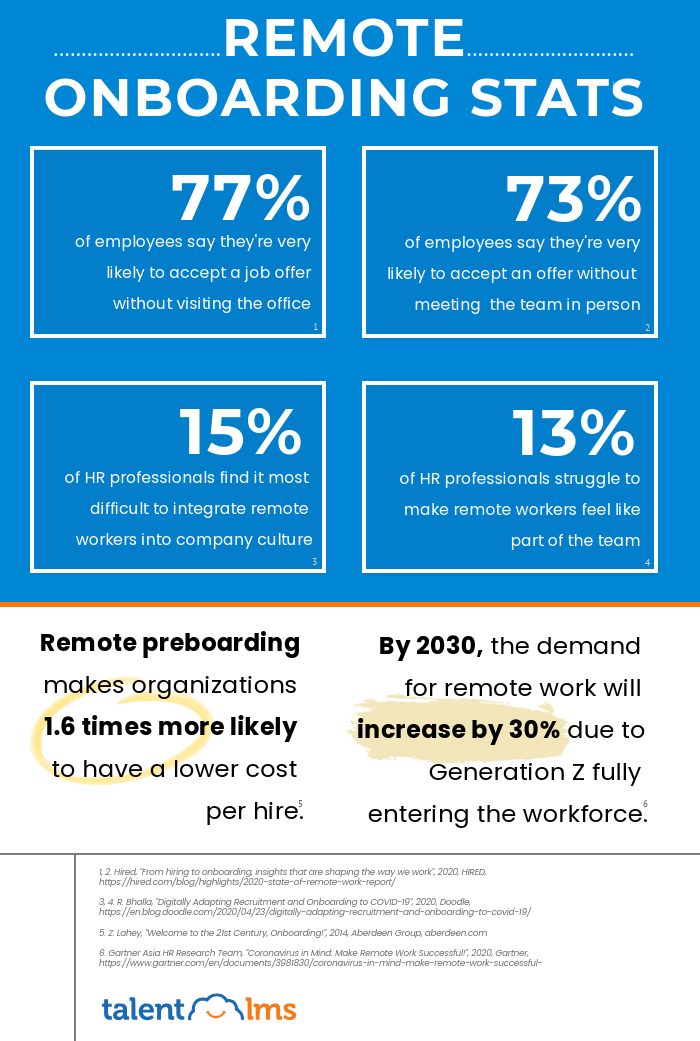Employee onboarding is gaining momentum, but it’s been around for as long as the concept of hiring and business have. However, over the past few years, multiple lists of onboarding trends have popped up. This one’s a little different.
UPDATE – 21 JULY 2020: This article was originally published a few days before the great lockdown. Since then, things in onboarding have changed and a new type was slowly introduced. And this is no other than remote onboarding.
So, before we start with our onboarding statistics, it would be useful to take a look at this trend and how it can benefit companies both in a time of crisis and in the long run.
Remote onboarding statistics
It’s no secret that the coronavirus outbreak has made remote work the new normal. According to the U.S. Bureau of Labor Statistics, in 2017-18, only 25% of employees worked from home — at least occasionally. Now that the pandemic has lifted the work-from-home stigma, more and more companies are willing to invest in this culture.
And with social distancing turning into a mentality, the same goes for remote onboarding which has been gaining popularity for quite some time now.

Now, business, as usual, people. Keep reading for the original piece zooming in on the onboarding statistics and trends, as they’ve been shaped over the past few years.
Based on employee onboarding statistics from multiple high-authority sources, this year, we managed to identify the employee onboarding trends you need to focus on if you want happy, engaged, and productive employees.
But this is not the end. Keep scrolling for 55+ employee onboarding statistics you didn’t know.
Preboarding
The world is changing. And new hires, just like everyone else, are continually being bombarded with various possibilities and options. And this might be the reason why ghosting at work has become such a massive trend over the past two years, or why 65% of employers say they’ve had job seekers accept an offer and never show up for their first day at work.
To prevent such practices and combine onboarding and retention, there’s only one thing you need to remember: preboarding.
Preboarding helps you connect with your candidates even before they come in, and it’s something that best-in-class companies are 35% more likely to do 1. And they’re best-in-class for a reason.
Preboarding, however, cannot happen in the office since the candidate has not officially become part of your team yet. To achieve it, the only solution you should be looking for is an employee onboarding software program.
Automation
We might be talking about onboarding, but we still haven’t addressed the elephant in the room. The onboarding process can be intimidating — especially for beginners who might not even know what onboarding is. And some of the main challenges, according to HCI, include:
- Inconsistent application
- Competing priorities
- Ability to measure ROI
- Buy-in
- Manager accountability
- Insufficient internal resources
All of them sound reasonable, but, luckily, there’s a solution: automation.
By automating your onboarding process, you can make sure that:
- Your learners will get their notifications on time
- Your managers will get their reminders to complete their tasks
- The system, in regular intervals, will generate a custom report so you can measure your ROI
All automatically.
Looking for a reliable onboarding platform to automate your needs?
Use TalentLMS to build and deliver your onboarding program in minutes.
Cultureboarding
It’s been in many onboarding statistics roundups for quite some time now. But today, more than ever, cultureboarding needs our attention.
If you’ve hired experienced professionals who, more or less, know the responsibilities their job role comes with, sooner or later, they’ll get a grasp of the hard skills required for the job. But what about company culture?
Processes, expectations, cultural fit, transparency… The list of the company-culture-related themes that a new hire can’t get familiar with that easily can go on forever. And still, 61% of new hires don’t get any training on it.
Offer company culture training during your employee onboarding process, and try to make sure everybody knows what a day at the office feels like – even before they accept the offer.
With 31% of employees quitting their job within their first 6 months, and 33% of employees saying that they want their managers to onboard them, it comes as no surprise that new hires want real relationships and to learn more about how colleagues communicate with each other and what the vibe in the office feels like.
Ambassadors
The trend of onboarding ambassadors is based on the concept of cultureboarding described above. Assigning a new hire with a company ambassador (aka “onboarding buddy”) helps them feel welcomed and part of the group, even if they’ve just stepped their foot on the doorstep.
Here are some interesting onboarding statistics to consider:
Microsoft wanted to measure the effect of onboarding buddies and their impact on productivity. As it turned out, 56% of new hires who met with an ambassador at least once in their first 90 days of their employee onboarding suggested that they became productive in their role faster. For those who met two to three times with their buddy in the same amount of days, the number increased to 73%, while for new hires who met four to eight times, the number skyrocketed to 86%.
And as for those who met with their ambassador more than eight times in their first 90 days at work? A whopping 97% say it affected their productivity extremely positively.
Crossboarding
Time to talk about the newest kid on the block. All the recent onboarding statistics and trends point in one direction: crossboarding.
Crossboarding came out of the shadows pretty recently, when companies realized that another way to fill a position is to do it by assigning their employees with a different job role and reskilling them.
Basically, crossboarding uses the organization’s current assets to fill in work opportunities that emerge instead of looking for new candidates. Each company takes their current talent pool, trains them, and encourages them to acquire the required skills to meet their new role’s expectations.
The benefits of crossboarding include cost reduction, employee motivation and development, as well as a better understanding of the company culture. And it all happens with training.
Reskill your employees with the training platform that ranks #1
With TalentLMS, you can easily build your online training courses in minutes.
Wait, there’s more! Keep scrolling for 40 (or more) onboarding statistics you didn’t know.
The Top Employee Onboarding Statistics for 2020

- Aberdeen Group, 2014, Welcome to the 21st Century, Onboarding!
Originally published on: 16 Mar 2020 | Tags: Online Employee Onboarding

